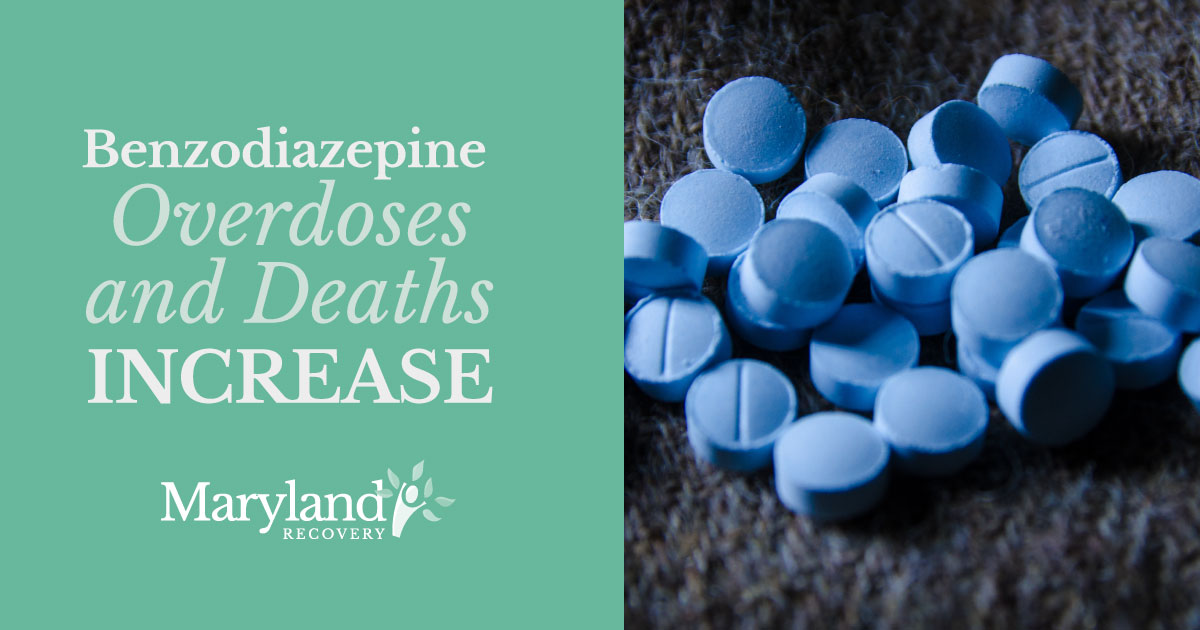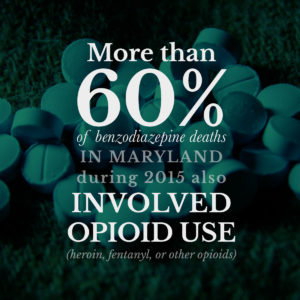 For the past several years, states and the media have focused their drug agendas on stopping an increasing opioid epidemic. Today, another serious class of drugs lurks in the shadows. Benzodiazepines are tranquilizers commonly prescribed for anxiety, muscle relaxation, insomnia, and seizure control. Benzodiazepine use and abuse have risen over recent years. The drug has risks on its own and when used in conjunction with other substances including opioids.
For the past several years, states and the media have focused their drug agendas on stopping an increasing opioid epidemic. Today, another serious class of drugs lurks in the shadows. Benzodiazepines are tranquilizers commonly prescribed for anxiety, muscle relaxation, insomnia, and seizure control. Benzodiazepine use and abuse have risen over recent years. The drug has risks on its own and when used in conjunction with other substances including opioids.
Explore Benzodiazepine Deaths by the Numbers
In 2015, the number of benzodiazepine deaths fell slightly. When combined with data that dates back to 2007, the trends show a steady increase over the years. The 2014-year spiked at 103 deaths, but the 91 deaths in 2015 outweigh the number of deaths in every previous year (excluding 2014) by a minimum of 18 deaths.
More than 60% of benzodiazepine deaths in Maryland during 2015 also involved opioid use (heroin, Fentanyl, or other opioids). The most significant problems lie in the Baltimore metro area, but data shows an upward trend in deaths in other regions as well.
The most recent widespread data published in a study in the American Journal of Public Health indicates a steep rise in benzodiazepine prescriptions and deaths from 1996 to 2013. During 2013, Medicare paid for almost 40 million benzodiazepine prescriptions – a valuation of $377 million. Anxiety is the leading reason why physicians today prescribe these tranquilizing medications.
The increase in prescription numbers, the potential for abuse, and rising deaths associated with use place benzodiazepines in a dangerous position. In Maryland and across the United States, benzodiazepines play a very real role in a growing substance abuse epidemic. Opioid, benzodiazepine, cocaine, and alcohol use have all risen in various regions over the past several years. Without extreme caution, any of these prescription and illicit substances can and do kill users.
How Benzodiazepines Work in the Body
Benzodiazepines include brand name medications such as Valium, Xanax, Klonopin, and Ativan. Valium is one of the strongest sleep-inducing drugs while the other tranquilizers act more to reduce anxiety levels. Benzodiazepines affect the central nervous system. They enhance the functioning of a neurotransmitter called GABA (gamma-aminobutyric acid) to suppress nerves and induce relaxation and sedation.
Benzodiazepine Withdrawal
In high doses, benzodiazepines can cause loss of consciousness, memory loss, coordination loss, and mood changes. They can also precipitate unusual dreams. The potential for addiction is strong at any dose when users take the substances regularly over time. Users develop tolerances as their brains adapt to life on the drug. Without the drug, the brain loses its ability to return to its prior functioning levels and withdrawal occurs.
Benzodiazepine withdrawal is equally as dangerous as – or more dangerous – to stop taking than opioids. Many people require a medical detox to stop using benzodiazepines successfully. Withdrawal symptoms can start within a day of stopping the drug and can cause gastrointestinal problems, anxiety, muscle pain, cognitive disorientation, hallucinations, and seizures among other symptoms.
Until the brain relearns how to function without the drug, a person may continue to feel some symptoms. Withdrawal can mimic certain mental health disorders including bipolar disorder and schizophrenia.
Benzodiazepine Deaths
On their own, benzodiazepines rarely cause overdose deaths. Instead, they increase the likelihood of death from other causes. In the aging population, taking a benzodiazepine can increase the risk for falls, car accidents, and other balance/cognition related activities. In younger populations, they may precipitate other very risky behaviors including mixing drugs or drinking and taking drugs.
Benzodiazepines can cause motor functioning and cognition problems that turn normal daily activities into deadly events. They can increase the risk of choking or suffocating.  Benzodiazepines can easily become deadly when taken with alcohol, opioids, or other drugs. Users may reach fatal dosing levels without realizing it, and the sedative effects of the tranquilizers may prevent users from reaching out for help.
Benzodiazepines can easily become deadly when taken with alcohol, opioids, or other drugs. Users may reach fatal dosing levels without realizing it, and the sedative effects of the tranquilizers may prevent users from reaching out for help.
When mixed with opioids or alcohol, benzos contribute to depressed respiratory responses. At overdose levels, the drug mixtures can significantly slow or stop a person’s breathing. Coma and death may follow without immediate medical intervention.
Benzodiazepines are associated with an increased risk of suicide. An unassisted withdrawal period can also contribute to complications and death. While few people overdose on benzodiazepines alone, the potential for benzodiazepine-related death is high. Every patient and recreational drug users should beware the dangers of taking benzodiazepines at low or high doses for any prolonged period of time.
Fighting the Benzodiazepine Problem
In Maryland, the Heroin & Opioid Emergency Task Force highlights opioids in its title, but it also focuses its work on benzodiazepines. Controlled substances with very addictive qualities, co-use problems, and rising addiction/death levels fall under the purview of the task force. According to a task force document, over 300 Maryland residents received a prescription for a controlled substance from at least five prescribing physicians in during a one-month period in 2015. This startling insight highlights just how serious the drug problem is in the state – and many other states fight the same battle.
Education, prevention, prescription reform, and rehabilitation all play a role in the fight against substance abuse addiction and death. Maryland Recovery engages in community outreach and offers rehabilitation programs focused on long-term recovery from opioids, benzodiazepines, alcohol, and other substances.
Permanent sobriety is possible, and every life saved is a step in the right direction. Understand the addictive nature of benzodiazepine prescriptions, and remember to seek outside support if you or a loved one needs help.
Benzodiazepine Withdrawal Can Be Deadly! If You Are Addicted to Benzodiazepines, Make Sure That Proper Medical Detox and Ongoing Addiction Treatment Are Included in Your Recovery Strategy:
Maryland Addiction Treatment Programs
Reviewed by Christopher Schwartfigure MS, LGPC, CAC-AD








